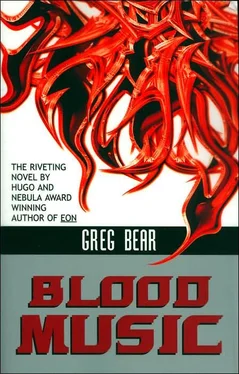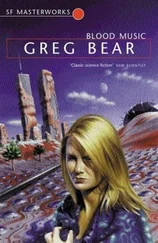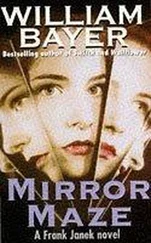Gregory Bear - Blood Music
Здесь есть возможность читать онлайн «Gregory Bear - Blood Music» весь текст электронной книги совершенно бесплатно (целиком полную версию без сокращений). В некоторых случаях можно слушать аудио, скачать через торрент в формате fb2 и присутствует краткое содержание. Город: New York, Год выпуска: 2005, ISBN: 2005, Издательство: ibooks, Incorporated, Жанр: Фантастика и фэнтези, на английском языке. Описание произведения, (предисловие) а так же отзывы посетителей доступны на портале библиотеки ЛибКат.
- Название:Blood Music
- Автор:
- Издательство:ibooks, Incorporated
- Жанр:
- Год:2005
- Город:New York
- ISBN:1596871067
- Рейтинг книги:4 / 5. Голосов: 1
-
Избранное:Добавить в избранное
- Отзывы:
-
Ваша оценка:
- 80
- 1
- 2
- 3
- 4
- 5
Blood Music: краткое содержание, описание и аннотация
Предлагаем к чтению аннотацию, описание, краткое содержание или предисловие (зависит от того, что написал сам автор книги «Blood Music»). Если вы не нашли необходимую информацию о книге — напишите в комментариях, мы постараемся отыскать её.
Blood Music — читать онлайн бесплатно полную книгу (весь текст) целиком
Ниже представлен текст книги, разбитый по страницам. Система сохранения места последней прочитанной страницы, позволяет с удобством читать онлайн бесплатно книгу «Blood Music», без необходимости каждый раз заново искать на чём Вы остановились. Поставьте закладку, и сможете в любой момент перейти на страницу, на которой закончили чтение.
Интервал:
Закладка:
The brown sheet had vanished, leaving only the holes in the wall. She opened the refrigerator and wedged the milk jugs into the lower shelf, then inspected what food was available for supper.
The clothes didn’t look right, just lying there. She took the broom and stirred her mother’s dress to see if anything was hidden beneath the folds; nothing was. With forefinger and thumb, she lifted the dress. Slip and panties fell out, and from the edge of the panties peeped a tampon, white and pristine. Something glinted near the collar and she bent to see. Little lumps of grey and gold metal, irregularly shaped.
The answer came to her too quickly, thought out with a panicky kind of brilliance she wasn’t used to.
Fillings. Tooth fillings and gold crowns.
She picked up the clothes and dumped them in the hamper in the service porch. So much for that, she thought. Good-bye Mother and Kenneth and Howard.
Then she swept the floor, pushing the fillings and dust (no dead cockroaches, which was unusual) into a dustpan and dropping them into the trash beside the refrigerator.
“I am the only one,” she said when she was finished. “I am the only one left in Brooklyn. I didn’t get sick.” She stood by the table with an apple in her hand, chewing thoughtfully. “Why?” she asked.
“Because,” she answered, twirling around the kitchen floor, eye going quickly to haunted corners. “Because I am so beautiful, and the devil wants me for his wife.”
21
“In the past four days,” Paulsen-Fuchs said, “contact with most of the North American continent has been cut off. The etiology of the disease is not known precisely, but it is apparently passed through every vector known to epidemiologists, and then some. Mr. Bernard’s materials indicate that the components of the disease are themselves intelligent and capable of directed action.”
The visitors in the viewing chamber—Pharmek executives and representatives from four European countries—sat in their folding chairs, faces impassive. Paulsen-Fuchs stood with his back to the three-layer window, facing the officials from France and Denmark. He turned and indicated Bernard, who sat at the desk, tapping its surface lightly with a hand heavily marked by white ridges.
“At great risk, and some foolhardiness, Mr. Bernard has come to West Germany to provide a subject for our experiments. As you can see, our facilities here are well-equipped to keep Mr. Bernard safely isolated, and there is no need for removal to another laboratory or hospital. Such a transfer could, in fact, be very dangerous. We are quite willing to follow outside suggestions on the scientific approach, however.”
“Frankly we don’t yet know what sort of experiments to conduct. Tissue samples from Mr. Bernard indicate that the disease—if we should actually call it that—is spreading rapidly throughout his body, yet in no way impairs his functions. In fact, he claims that with the exception of certain peculiar symptoms, to be discussed later, he has never felt better in his life. And it is apparent that his anatomy is being altered substantially.”
“Why hasn’t Mr. Bernard been transformed completely?” asked the representative from Denmark, a young-looking plump man in a black suit, his hair like close-cropped fur. “Our few communications with the United States show that transformation and dissolution takes place within a week of infection.”
“I don’t know,” Bernard said. “My circumstances are not the same as victims in a natural environment. Perhaps the organisms in my body are aware that it would do them no good to complete the transformation.”
The dismay on their faces showed they were still not used to the concept of noocytes. Or perhaps they simply did not believe.
Paulsen-Fuchs continued the discussion, but Bernard closed his eyes and tried to shut the visitors out. It was worse than he had imagined; in just four days, he had been subjected—politely enough, and with great concern—to fourteen such meetings, to a battery of tests conducted through the sliding panel, to questions about every aspect of his life, past, present, private and public. He was the center of a secondary shock wave spreading around the world—the wave of reaction to what had happened in North America.
He had gotten out just in time. The etiology of the plague had altered drastically and now followed several patterns, or perhaps no pattern at all; it was possible the organisms reacted to their environment and altered their methods accordingly. Thus, large cities tended to be silenced immediately, most or all of their citizens being infected and transformed within forty-eight hours. Outlying towns and rural areas, perhaps because of a lack of common sewage and water systems, were affected less rapidly. Spread of the plague to these areas appeared to proceed through animal and insect vectors as well as direct human contact.
Infrared pictures taken by Landsats and spy satellites, processed and interpreted by countries like Japan and Great Britain, showed incipient changes even in the forests and waterways of North America.
Already, he felt like Michael Bernard no longer existed. He had been swallowed up in something larger and far more impressive, and now he was on display in a museum, tagged and curiously enough, able to talk back. Ex-neurosurgeon, male, once well-known and wealthy, not very active of late, caught in social whirl and with scads of money to spend from lecture tours, book royalties, appearances in motion pictures…
It seemed quite possible that Michael Bernard hadn’t existed for six years, having vanished sometime after he last applied scalpel to flesh, drill to skull.
He opened his eyes and saw the men and one woman in the chambers.
“Dr. Bernard.” The woman was trying to attract his attention, apparently for the third or fourth time.
“Yes?”
“Is it true that you are at least in part to blame for this disaster?”
“No, not directly.”
“Indirectly?”
“There was no way I could have foreseen the consequences of other peoples’ actions. I am not psychic.”
The woman’s face was visibly flushed, even behind the three layers of glass. “I have—or had—a daughter and a sister in the United States. I am from France, yes, but I was born in California. What has happened to them? Do you know?”
“No, Madame, I do not.”
The woman shrugged Paulsen-Fuchs’ hands away and shouted, “Will it never end? Disaster and death, scientists– responsible, you are all responsible! Will it—” And she was hustled from the viewing chamber. Paulsen-Fuchs raised his hands and shook his head. The two chambers quickly emptied and he was left alone.
And since he was nothing, nobody, that meant that when he was alone, there was nothing there at all.
Nothing but the microbes, the noocytes, with their incredible potential, biding their time… unrealized.
Waiting to make him more than he had ever been.
22
The lights went out on the fourth day—in the morning, just after she awoke. She put on her designer jeans (from the Salvation Army thrift store) and her best bra and a sweater, took out her windbreaker from the closet behind the stairs, and stepped out into the daylight. No longer blessed, she thought. No longer desirable to the devil or anybody. “My luck’s running out.” she said aloud.
But she had food, and the water was still running. She considered her situation for a moment and decided she wasn’t that badly off. “Sorry, God,” she said, squinting at the sky.
Across the street, the houses were completely draped with mottled brown and white sheets that glistened like skin or leather in the sun. The trees and iron railings were hung with tatters of the same stuff. The houses on her side were starting to be overgrown, too.
Читать дальшеИнтервал:
Закладка:
Похожие книги на «Blood Music»
Представляем Вашему вниманию похожие книги на «Blood Music» списком для выбора. Мы отобрали схожую по названию и смыслу литературу в надежде предоставить читателям больше вариантов отыскать новые, интересные, ещё непрочитанные произведения.
Обсуждение, отзывы о книге «Blood Music» и просто собственные мнения читателей. Оставьте ваши комментарии, напишите, что Вы думаете о произведении, его смысле или главных героях. Укажите что конкретно понравилось, а что нет, и почему Вы так считаете.












